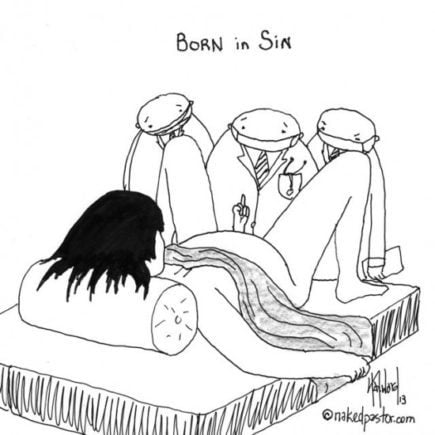
In light of comments on the post Do Evangelical Beliefs Lead to Psychological Damage?, I thought I would give several reasons why I think Evangelical beliefs and practices are psychologically harmful.
Evangelical Christianity teaches that everyone is born with a sinful nature. People do not become sinners; they are, by nature, sinners. From the moment people come into this world, they are sinners who are at variance with God. This is the lot of the human race, according to Evangelicals. No one, except Jesus, is exempt. We have no choice in the matter.
What is sin? Sin is, according to Evangelicals, transgression of the law of God. (1 John 3:4) God is Holy. He hates sin and those who do it. Yes, God HATES sinners! (Please see Does God Hate? and God Hates the Sin but Love the Sinner.) All of us deserve to be eternally punished in the Lake of Fire for our sins. Because of Adam’s sin in the garden of Eden, we deserve to be tortured in the flame of Hell for eternity. Or so Evangelicals say, anyway.
Jesus came to earth to redeem people from their sins. According to Evangelicals, God demands human sin be atoned for through a blood sacrifice. When Jesus was on the cross, the wrath of God the Father was poured out on Him — wrath that Jesus did not deserve. Taking our sins and punishments upon himself, Jesus died on the cross to satisfy our sin debt.
Justification by faith is central to Evangelical soteriology. Simply put, the term means that God looks at a saved (born again) sinner “just as if they never sinned.” How is this possible? God hasn’t changed! He still hates sin and those who do it. He still throws people in the Lake of Fire to be tormented for eternity. God is God, and this is what God does. It is only through the merit and work of Jesus that born-again sinners are saved from the fury of a wrathful God. Jesus stands between the saved sinner and God, taking on the violence that rightfully belongs to saved and unsaved sinners alike. When God looks at saved sinners, all he sees is his son Jesus.
What I have written above is Evangelicalism 101. It is classic substitutionary atonement, justified-by-faith, Protestant theology. Understanding this will be key to what follows.
How do Evangelicals view themselves?
- I am a sinner. I sin daily in thought, word, and deed.
- Even now, I deserve punishment from God.
- The only difference between me and the worst of sinners is that I have accepted Jesus Christ as my Lord and Savior. The blood of Jesus covers my sin and I am, by faith, justified before God through the merit and work of Jesus.
- No matter what suffering and pain comes in my life, I should be grateful that I am saved and that I have escaped eternal punishment in the Lake of Fire.
Most Evangelical pastors spend significant amounts of time preaching about sin. These self-described men of God really can’t be faulted for doing this. As People of the Book, they must preach what the Bible says — and the Good Book certainly has a lot to say about sin, judgment, and chastisement.
In the Old Testament alone there are 613 laws. Then there is the New Testament with all the new laws added by Jesus, Paul, John, and Peter. Add to these the personal interpretation of these laws, commands, and precepts by Evangelical preachers . . . well, there’s plenty of sin to preach about.
Needless to say, there is a lot of guilt and fear among Evangelical believers. For all their talk about grace, Evangelical preachers spent inordinate amounts of time preaching sermons meant to cause listeners to feel guilty and fearful. Despite being “miraculously” saved, Evangelicals still sin —often more so than the unwashed, uncircumcised Philistines of the world. No matter how often pastors preach about this or that sin, preachers and congregants alike continue to sin. Evangelicals commit sexual sins, divorce, felonies, misdemeanors, and have abortions, all at levels similar to those who never darken the doors of Christian churches. And thanks to the Internet, we now know that Evangelical pastors, deacons, Sunday school teachers, worship leaders, youth directors, and run-of-the-mill congregants abuse and sexually assault children and prey on vulnerable teenagers and adults. (Please see the Black Collar Crime series.)
Despite knowing all of this, Evangelicals preachers — ignoring their own secret sins — continue to berate and badger congregants over their sinful behaviors. How DARE you sin!, Evangelicals preachers proclaim. Look at what Jesus did for you! The Bible says, how dare they, who have been freed from sin, continue any longer therein?
Evangelicals believe that the third person of the Trinity — the Holy Spirit — lives inside them and is their teacher and guide. The Holy Spirit is a sin-o-meter of sorts. When temptation comes, the sin meter starts saying, NO! NO! Don’t do this! Turn! Run! Leave! Stop!
Yet, even with Jesus saving them, the Holy Spirit living inside of them, the Bible as the Words of God, and thundering preachers reminding them of the dangers of sins, Evangelicals still sin like just like the rest of us. Try as they might, Evangelicals can’t kick their sin habit. This ever-present reality results in a lifetime of guilt and fear.
Evangelical church altars are routinely lined with people “getting right with God.” Churches hold revival services so congregants can wipe their sin slates clean and return to walking the straight and narrow way. Pastors weekly spend hours counseling church members who find themselves ensnared by Satan — caught up in temptation and sin. Preachers themselves are routinely caught up in this or that sin. If a preacher can’t walk the talk, is it realistic to expect lesser Christians to do so?
For all their talk about forgiveness and deliverance, sin is still the number one problem Evangelicals face daily. No matter how much they pray, asking for forgiveness, sin keeps returning, spoiling their attempts to live Godly lives. A lifetime of this kind of living makes people emotional train wrecks. Over time, Evangelicals learn how to “hide” their sin. They learn the right things to say when asked about how things are in their lives. They learn how to play the “I am right with God” game. These bought-by-the-blood Evangelicals learn to erect a façade that masks the reality of their lives.
Sinning Evangelicals know they are frauds and hypocrites, yet they dare not admit this to anyone. Little do they know that EVERYONE, including the pastor, is just like they are. Some Evangelicals, after decades of being on the sin roller coaster, decide to get off. They crave an opportunity to live authentic lives, lives that are free from the emotional weight of guilt, fear, and condemnation.
Getting off the roller coaster is not easy. The emotional baggage weighs people down. Isn’t their walking away the BIGGEST sin of them all? Doesn’t this prove that they never were real followers of Jesus? Their churches, pastors, and fellow Evangelicals will condemn them for throwing in the towel. Their defection will be viewed in light of what the Bible says about them: they went out from us because they were not of us. For if they were of us, they would have continued with us.” (1 John 2:19) Leaving is PROOF that they never were the real deal. No matter how many years they faithfully walked the straight and narrow, the singular act of leaving undoes all the good they did in the name of Jesus.
Once free, an interesting thing happens: guilt and fear begin to recede. Psychological stress starts to fade. For the first time in years, they experience peace. For them, it took leaving the Prince of Peace to experience inner peace.
Instead of lives dominated by thoughts of their sinfulness, these former Evangelicals learn that many (most) of the actions the Bible, along with what their pastors and churches called sin, are not sin at all. As time goes on, their “sin” list becomes smaller and smaller. Perhaps they learn that there isn’t really any such thing as sin. People do good and bad things, and should be judged, not by a moral standard found in an antiquated book, but by a basic humanistic, common morality — morality that respects the private acts of consenting adults; a morality that recognizes that many of the acts of other human beings are none of their business.
These former Evangelicals now have the freedom to live their lives on their own terms. Evangelical zealots from their past will warn them that they have made themselves their own God and that if they are not careful, they will become reprobates — those whom God has given over to the list of sins recorded in Romans 1 and 2. These types of threats no longer have the desired effect. Why? Because their minds have been freed from the chains of Evangelical Christianity. They now know what it is to have true freedom. Once free, having experienced the peace that passeth all Evangelicalism, they will never return to the garlic and leeks of Evangelical Christianity. To quote an old Southern Gospel song . . .They have gone too far to turn back now!
Bruce Gerencser, 68, lives in rural Northwest Ohio with his wife of 47 years. He and his wife have six grown children and sixteen grandchildren. Bruce pastored Evangelical churches for twenty-five years in Ohio, Texas, and Michigan. Bruce left the ministry in 2005, and in 2008 he left Christianity. Bruce is now a humanist and an atheist.
Your comments are welcome and appreciated. All first-time comments are moderated. Please read the commenting rules before commenting.
You can email Bruce via the Contact Form.

